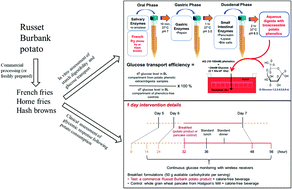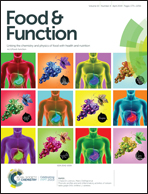Potato product form impacts in vitro starch digestibility and glucose transport but only modestly impacts 24 h blood glucose response in humans†
Abstract
Potatoes are rich in phenolic compounds which have been reported to impact starch digestion and intestinal glucose transport in model systems through phenolic–starch interactions. While these effects are well documented for pigmented potatoes and in model systems, the relevance of phenolics to the glycemic properties of processed colorless potato-based foods under naturalistic conditions remains unclear. This study assessed impacts of processing on phenolic concentrations, resistant starch content and glycemic properties of Russet Burbank and Shepody potatoes. Product forms included French fries, shredded (hash browns) and diced (home fries) produced through commercial processing as well as parallel in-home techniques. Commercial products had significantly higher concentrations of resistant starch (p < 0.05, 1.48–6.57 vs. 1.23–2.22 g per 100 fresh weight) and resistant starch/total starch ratio (5.42–18.3% vs. 3.58–7.62%) compared to freshly prepared counterparts, while statistically lower total caffeoylquinic acid content (2.94–10.9 vs. 11.5–25.2 g per 100 fresh weight). Glucose release and intestinal transport assessed using an in vitro digestion/Caco-2 cell monolayers model demonstrated a reduction in d7-glucose intestinal transport from commercially processed products relative to fresh prepared counterparts (p < 0.05, 31.3–61.2% vs. 79.3–110% at 60 min). Commercial Russet Burbank potato products including French fries, home fries and hash browns were then selected for clinical assessment of glycemic response and appetite rating by 23 participants (11 male and 12 female). The three products presented a subtle but discernable ascending trend (French fry ≥ home fry ≥ hash browns) for incremental area under the curve (IAUC, 95.2 ± 12 vs. 105 ± 10 vs. 107 ± 14 mM min, p < 0.05) at 2 h post breakfast and for appetite rating (45.2 ± 6.3 vs. 52.4 ± 4.1 vs. 57.7 ± 7.2 for hunger) at 4 h post breakfast with no significant difference from the control (whole wheat pancake). These results suggest that potato phenolics have only a modest influence on acute glycemic responses.



 Please wait while we load your content...
Please wait while we load your content...